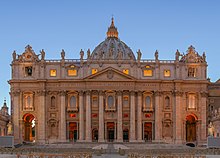| Part of a series on the |
| Catholic Church |
|---|
 St. Peter's Basilica, Vatican City |
| Overview |
|
Miscellaneous Relations with: |
|
Links and resources |
|
|
This is a glossary of terms used within the Catholic Church. Some terms used in everyday English have a different meaning in the context of the Catholic faith, including brother, confession, confirmation, exemption, faithful, father, ordinary, religious, sister, venerable, and vow.